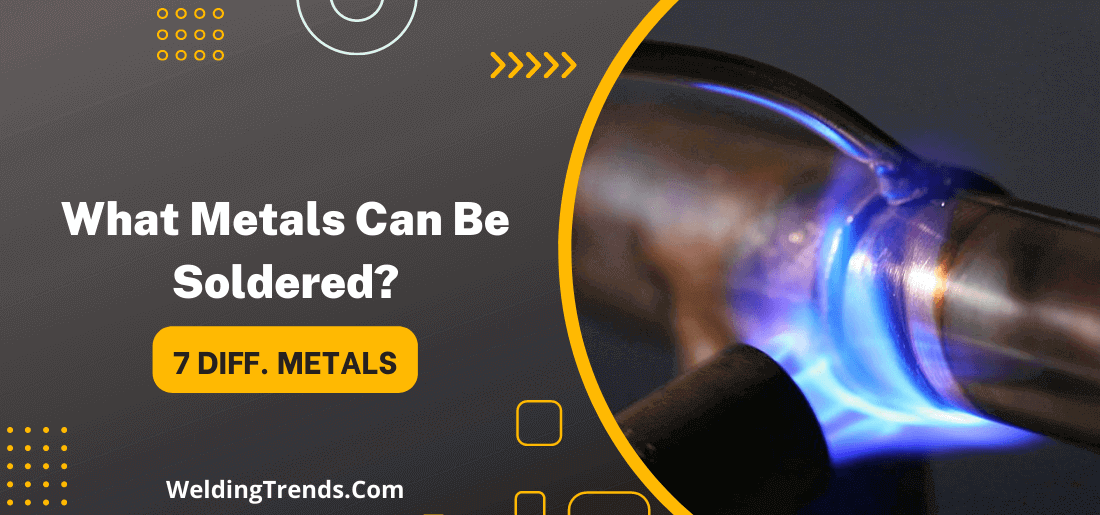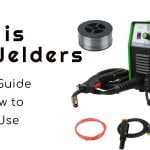Soldering is a process that joins two or more metal surfaces together by heating them to a temperature that is high enough to melt the solder, which then bonds to the metals.
For solder to adhere properly, both the surfaces being joined must be clean and free of oxides. There are many different types of solder available, each with its own set of characteristics. So, what metals can be soldered? Let’s take a look.
What is soldering and what are the benefits of using it to join metal pieces together?
Soldering is a process in which two or more pieces of metal are joined together by heating them to a temperature that is high enough to melt the solder. A solder is a material that has a low melting point and is used to create a bond between two pieces of metal.
Benefits of using soldering include:
- It is a strong and durable joint
- It is less likely to come apart than other methods such as welding
- It can be used on a variety of different metals
- It is a relatively quick and easy process
- The joint can be easily repaired if it comes apart
Types of metals that can be soldered
There are a variety of different metals that can be soldered together, including:
- Aluminum
- Brass
- Copper
- Gold
- Silver
- Tin
- Zinc
Lead-free solder can also be used on these metals. In addition, there are many different types of solder available, each with its own set of characteristics. The type of solder you use will depend on the type of metal you are soldering and the application.
Some metals, such as aluminum and brass, can be more difficult to solder than others. This is because they have a higher melting point and require a more powerful soldering iron.
Gold and silver are also difficult to solder because they tend to oxidize quickly. However, with the proper tools and techniques, soldering these metals is possible.
Tin is the most common type of metal used in soldering. It has a low melting point and is easy to work with. Tin-based solder is typically used for electrical applications.
Zinc is another common type of metal used in soldering. It is less expensive than tin and has a higher melting point. Zinc-based solder is typically used for structural applications.
How to solder different types of metals?
The type of metal you are soldering will determine the best way to solder it. Aluminum, brass and copper can be soldered using a variety of methods, including:
- TIG welding
- MIG welding
- Oxyacetylene welding
With these methods, a torch is used to heat the metals until they reach their melting point. The solder is then added to the joint and allowed to cool, creating a strong bond.
Iron and steel can also be soldered, but the process is a bit different. First, the metals must be cleaned with a wire brush to remove any rust or corrosion. The area to be soldered should then be heated with a torch until it is red-hot. The solder is then applied to the joint and allowed to cool. This method is known as forge welding.
Tips for creating a strong and lasting solder joint
- Make sure the surfaces to be soldered are clean and free of any debris or contaminants.
- Use the appropriate amount of solder – too little will result in a weak joint, while too much can cause problems with excess solder not adhering properly to the surface.
- Heat the joint evenly using a soldering iron – this will help the solder to flow evenly and create a stronger bond.
- Apply pressure to the joint while the solder is still hot, to ensure that it forms a strong connection.
- Allow the joint to cool completely before using or testing it – rushing this step can cause problems with the integrity of the joint.
By following these tips, you can ensure that your solder joints are strong and lasting.
This is especially important for electrical or electronic applications where a weak joint could result in shorts or other problems. With a little care and attention, you can create reliable solder joints that will stand the test of time.
What safety tips should you keep in mind when working with solder and metal pieces that will be joined together through this process?
There are a few safety tips to keep in mind when working with solder and metal pieces:
- Wear gloves and protective eyewear to avoid coming into contact with the hot solder.
- Work in a well-ventilated area to avoid inhaling fumes from the soldering process.
- Keep flammable materials away from the area where you will be working.
- Have a fire extinguisher on hand in case of accidents.
- Never leave the soldering iron unattended while it is turned on.
Be sure to follow all safety precautions when working with solder and metal pieces. By taking these precautions, you can avoid injuries and accidents.
Are there any special precautions you need to take when soldering different types of metals together?
When soldering different types of metals together, it is important to be aware of the different melting points of the metals.
For example, aluminum has a lower melting point than copper. This means that if you are soldering aluminum to copper, you need to be careful not to overheat the aluminum. Otherwise, it will melt and the joint will be weak.
It is also important to use the appropriate type of solder for the metals you are joining. For example, lead-based solder should not be used on aluminum. This is because the lead will contaminate the aluminum and make it more difficult to weld.
By following these tips, you can ensure that your solder joints are strong and lasting. With a little care and attention, you can create reliable solder joints that will stand the test of time.
Can you give some examples of projects that use soldered joints to connect metal pieces?
10 Examples of projects that use soldered joints to connect metal pieces include:
- Electrical wiring
- Jewelry making
- Model making
- Metal sculpture
- Building metal framework
- Repairing metal objects
- Making stained glass windows
- Assembling electronic circuits
- Making electrical connections in a car
- Building a metal fence
These are just a few examples of projects that use soldered joints to connect metal pieces. There are many more applications where this technique can be used. With a little creativity, the possibilities are endless.
FAQs – sautered metal
Which metal should be avoided in soldering?
Lead should be avoided in soldering because it can contaminate the metal and make it more difficult to weld. Because of this, it is important to use the appropriate type of solder for the metals you are joining.
What metals can I soft solder?
You can soft solder aluminum, brass, bronze, copper, iron, nickel, silver, tin and zinc. They can be found in Electrical wiring, jewelry making, model making, metal sculpture, building metal framework and repairing metal objects.
Can you solder on aluminum?
Yes, you can solder on aluminum. However, it is important to be aware of the different melting points of the metals.
For example, aluminum has a lower melting point than copper. This means that if you are soldering aluminum to copper, you need to be careful not to overheat the aluminum. Otherwise, it will melt and the joint will be weak.
What kind of solder will stick to aluminum?
The best type of solder to use for aluminum is lead-free solder. This is because the lead can contaminate the aluminum and make it more difficult to weld.
Can solder stick to steel?
No, the solder will not stick to steel. This is because the melting point of steel is much higher than the melting point of solder. As a result, the solder will simply melt and run off the surface of the steel.
If you need to join steel pieces together, you will need to use a different method such as welding or brazing.
Wrap Up
There are a few types of metals that can not be soldered such as aluminum. All other metals including gold, silver and copper can be soldered. When welding two pieces of metal together it is important to make sure the area being joined is clean from any dirt or grease.
If you have questions about what metals can be soldered feel free to ask an associate at your local hardware store.




